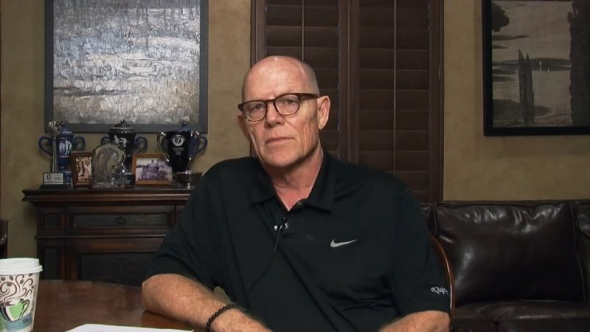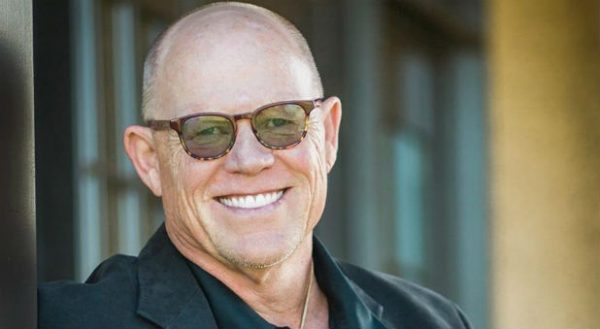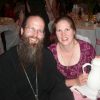Can you say a few words about your background?
I grew up in a Christian family in the Netherlands. Dutch is my first language. My parents were part of the Dutch Reformed Church with a Calvinistic orientation to spirituality.
Calvin believed that people were born predestined to destruction or to Life. In other words, their lives were theistically determined ahead of time. If you were elect, you were going to believe in God and you were going to spend eternity with Him, but if you were a reprobate you would spend the eternity apart from God. Everyone is created in such a way that they cannot respond to the Gospel. Then God “regenerates” some and then they must respond to the wooing of the Holy Spirit. There’s a certain theistic fatalism involved in Calvinism. Recognizing it as a young boy, I decided I didn’t want to have a whole lot to do with Christianity because in my mind that was Christianity.
I became an atheist only to recognize that you have the same inherent problem in atheism where everything is a function of molecules in motion, so you’re a product of brain chemistry and genetics. Therefore, free will doesn’t play any part in the equation. When I recognized that, I began looking at the evidence for the historic Christian faith anew. I started by looking at the issue of origins, because how one views their origins ultimately will determine how they live their lives. Then I started looking at the evidence for the Resurrection of Jesus Christ, which is the most seminal point of all of human history, and at the evidence for the Bible as a reliable authority.
Was that search prompted by an incipient faith or by some kind of experience?
It actually happened as a result of three people visiting me and challenging me to look at the evidence for the historic Christian faith. It was interesting because they were intending to visit a neighbour who had visited their church and they knocked on the wrong door. And in a stumbling-bumbling way, they were presenting the Gospel to me.
I was trying to upset the conversation with objections to the historic Christian faith. Then one of them said to me, “We happen to have a debate in our church on the issue of origins a week from now. If you have an open mind, you ought to attend.” I felt myself irresistibly drawn to that particular debate. That’s what really started the whole process of looking at the evidence that the historic Christian faith was not a blind leap into a dark chasm but rather a faith founded on a rational fact.
What church was it?
That was the church that was a very dominant, prominent church in Fort Lauderdale, FL called Coral Ridge Presbyterian Church. The irony of it is, Presbyterians hold very much to the same theological structure that I walked away from – predetermination.
Did you start attending the Presbyterian congregation?
I did as a result of this. I was very enamoured by the pastor. He was a tremendous orator, and he was also someone that had a great command of the English language, both things that I loved. The other thing that really drew me to him was that he had memorized a lot of the Bible. When I met him, he told me all Christians memorized the Scriptures. And by the time I found out that all Christians did not, I was already hooked on memory. That particular discipline allowed me to do what I’m doing today as host of the Bible Answer Man broadcast and the many other things that are involved in being President of the Christian Research Institute.

How did you become involved with the Christian Research Institute?
Early on, the founder of the Christian Research Institute [Walter Martin – Ed.] had met me by coming to one of my memory seminars and he was very impressed with my memory. He himself had an innate ability to memorize, but he saw in me that memory can also be a discipline that could be learned. And he wanted to me to take the cults and where they deviated from the historic Christian faith and make it memorable for people. That’s how I started working with him. First a friendship was forged, then I went on the board of the CRI, and later on became President.
Were you still a member of the Presbyterian?
As president of the Christian Research Institute – I had been president of the Christian Research Institute since the late eighties, so during approximately three decades – I was involved in many different Evangelical traditions, from Presbyterianism to Pentecostalism, to several Mega-Churches that I had attended over the years.
Did you have own understanding of Christianity in your journey from Church to Church?
There was a core set of values that always animated my Christian experience. It is what C.S. Lewis referred to as “mere Christianity.” The idea that in essentials, there must always be unity, in non-essentials, we can have liberty, and in all things charity.
So, when we talk about the essentials of the historic Christian faith, we’re talking about such things as the deity of Jesus Christ. If someone denies the deity of Jesus Christ, they are therefore by definition not Christian, because the deity of Jesus Christ is a core value of the Christian faith.
The Trinity is another classic example of an essential of the historic Christian faith. We say, “In the Name of the Father, and the Son, and the Holy Spirit.” These are things in many cases that we can only apprehend, we can’t fully comprehend.
Then, there are secondary issues, not in the sense that they are unimportant, but we don’t have to divide over them. For example, we talk about the end times, we know that Jesus will appear a second time, but the details are often debated. Some people believe in the Pre-tribulation rapture, some believe in a thousand-year literal millennial kingdom on Earth.
But in essentials there has to be unity, because once you stray from those essentials, you stray from what is the historic Christian faith.
You mentioned previously that you felt disenchanted by the attitude of some pastors and that that prompted your search or, your, as you termed it, “exploration”. Can you elaborate on that?
I got more and more disenchanted at what I sometimes termed as the “pastor-preneur.” This idea of a pastor being an entrepreneur through learning a particular formula of getting people into seats and then building an enterprise around the charisma of a particular pastor. Then that pastor has their own interpretation or their own nuances that they bring. As a result of that in Protestantism you have thirty thousand or more different expressions. In some cases, you can say that these expressions are tantamount to everyone being their own Pope. There’s no accountability. Someone comes to the Bible and says, “This is what the Bible means to me.” That became increasingly problematic.
As a result of that, I wanted to go back and see what the historic Christian faith always taught on particular issues. In other words, what is the communal or community memory that is passed down historically from Jesus to the Apostles, from the Apostles to the Church Fathers, and then to subsequent ages. When you go back and look at history, you become more and more disenchanted with people coming up with their own theological paradigms in the present.
That was one of the greatest attractions for me in Orthodoxy. Orthodoxy is historic, it relates to community memory, it is not innovative. Orthodoxy in contrast is trying to perpetuate the faith that was once and for all delivered to the Saints. And this is passed down in the historical sense. If you look at the Didache for example, you have some sense of how the early Church worshipped. And if the early Christian Church worshipped in that way, then perhaps it ought to be a precedent for us today.
In all of these things, there was this contrast between what goes on in modern-day churches where you have this continual fissuring as everyone becomes their own Pope instituting their own dogma, and the historic Christian faith that had been passed down, tried and true, and consistent with the teachings of New Testament Christianity.
What led you to the parish of St. Nektarios?
St. Nektarios was an experiment for me. I reached this sense of disillusionment that we just talked about. I told my wife and my children that I was going to do some exploring.
In my mind I thought I couldn’t do Roman Catholicism because in Roman Catholicism the Pope can speak ex cathedra or from the Chair of Peter. He can effect new dogma very much as a pastor-preneur can. So, there’s really no advancement in that sense. There are dogmas within Roman Catholicism that I personally cannot adhere to – Purgatory, Limbo being two examples. So, I thought I can’t do Roman Catholicism, though I do have a great respect for Roman Catholics. Some of the greatest Apologetics in the world are Roman Catholics, some of the greatest defenders of the faith, some of the people doing the greatest work for charity.
But I’d never really examined Orthodoxy. I knew a lot about Orthodoxy from an intellectual standpoint, but whenever I attended an Orthodox church, there was always a language barrier. Whenever I attended an Orthodox church be it in Moscow, in Kiev, or in Israel, there was always a language barrier. So, I thought, “Let me try an Orthodox Church in America, perhaps there would be no language barrier.”
I googled St. Nectarius’ which was close to where my office was and where my home was and I attended a service. After Liturgy, I went up to receive the fellowship bread, and one of the priests looked at me and said, “Are you Hank Hanegraaff? Oh, we love your ministry!” So that was my first experience, which was a great experience.
I continued to go for a few weeks. Then my wife and kids got so intrigued they said, “Can we go with you?” I said, “No, you’re going to freak out. I don’t think you’re ready to go with me.” Finally, after they’d begged me enough I said, “Okay, I’m going to get a little primer on Orthodoxy. You read that first, then I’ll take you along with me.” So, I got a little primer written by Frederica Mathewes-Green. A very-very short overview on Orthodoxy: why the smells, why the bells, why the icons. They went with me and they loved it. We started to go then as a family.
During this period of almost three years, I continued to explore Orthodoxy feeling as though I was submerged in a treasure chest, that I could never find the bottom to it. The more I learned about Orthodoxy, the more I loved it.

What were the things that you found most appealing in Orthodoxy?
The first thing I loved about Orthodoxy, is its resolute commitment to the Real Presence of Christ in the Eucharist. Which is what the early Church taught in a unanimous fashion right through the time of Luther. Meaning that even Luther believed in the Real Presence of Christ in the Eucharist.
Now, in the Eastern Church there is, I think, something very wise that the Western Church doesn’t do. In the Eastern Church, the Real Presence of Christ is held to as a Mystery. Which is to say, it doesn’t try to explain how Christ can really be present in the elements.
Whereas, in the Western Church, if you’re a Lutheran you say “Christ is in there under the elements.” If you’re a Roman Catholic you talk of “the transformation of the elements,” where you’re looking at the accidents but the elements have been transubstantiated.
Then again, you cannot really explain the Mystery of the Trinity, or the Mystery of the Incarnation. You cannot fully explain, it, but if you could fully explain a Mystery, then your God would be far too small. This is one of the core values that I loved about Orthodoxy.
I also love Liturgy, because Liturgy is, in a sense, like a spiritual gymnasium. If I’m in the physical gymnasium, you do something over and over again which builds strength and stamina. The same thing is true from a spiritual point of view. You have ascetic practices, you have the Liturgy that are repeated over and over again and that become part of who you are and build spiritual fibre.
As I enveloped myself in Orthodoxy, I began to order my life around the Divine. As a result of that, when I was diagnosed with a very serious cancer (Mantle Cell Lymphoma) shortly after I was chrismated, I was simultaneously enveloped in a blanket of peace. And I lived with that peace ever since. Quite frankly, I don’t know how I would be functioning today if it were not for the intersection of my Chrismation and my cancer. So, I’m deeply grateful that the Lord allowed those two things to intercept as they did.
I love what the Russian theologian Vladimir Lossky said that after the fall, the whole of human history is a shipwreck that is awaiting rescue, but the court of salvation is not the goal. It is for the shipwreck to continue on their journey to union with God. This is one thing that we continually find with Orthodoxy.
Orthodoxy continually presents the Church as the Ground and the Pillar of Truth. it is the vehicle by which we receive the graces where we can go on to union with God, what the ancients spoke about when they talked about theosis, what Peter spoke about when he spoke about becoming the partaker of the Divine Nature.
What did you find particularly helpful during your catechumenate?
I read voluminously. I knew a lot about the Bible having memorized huge portions of it. I defended the Bible, I’d been immersed in Scripture. I do a nationally syndicated radio broadcast called the “Bible Answer Man” broadcast. So, the Bible is really precious to me.
But I had a gap in my learning when it came to history. I think a lot of people, particularly within the Evangelical world, can relate to that. They can think back maybe as far as the Reformation as though history started then, when in 1570 Martin Luther nailed Ninety-Five Theses to the castle door in Wittenberg.
But there were fifteen hundred years of history before that. And most Christians are not that familiar with that history. I was largely guilty of that myself. I kind of knew the broad strokes, I knew enough, but I didn’t know that much, let’s say, of Ignatius of Antioch or perhaps Athanasius and his famous aphorism, “God became man, so that man might become God.” So, Church history was a bit of a black hole for me and I spent many years studying Church history, familiarizing myself with the vacuum that had been allowed to exist in my life for a long time.
The more I studied the ancient Fathers, the more I fell in love with Orthodoxy. And I felt very much like the man in Matthew Chapter 13, that Jesus talked about, who found a great treasure in a field, and then he reburied it and went away and sold everything he had so that he could go back and possess that field. And I felt that I found the treasure of Orthodoxy, that multifaceted jewel of Orthodoxy.
I was willing to stake my whole life and ministry on the idea that within the context of the Church I could work out my faith with fear and trembling as God continually gives me the graces by which I can experience that union with God. So, I was willing to put it all on the line really primarily because of my belief in the Real Presence of Christ, but also because of the many other aspects of Orthodoxy which point to the fact Christianity is not transactional. Meaning that I prayed a prayer, and now I have a get-out-of-jail-free card and I’m not going to go to hell, I’m going to go to Heaven and I can live as a baptised secular humanist.
The idea being that the Christian faith is transformational, meaning that we are going from glory to glory. In the Western Church that sometimes it is taught about in terms of “sanctification.” But the idea is, as Vladimir Lossky so eloquently said, to continue on the journey to union with God, the very thing that we are created for.
The sad thing for me is that in many cases as I encounter cradle Orthodox all over the world I think in some sense they’ve lost touch with the jewel themselves. Which is to say, by way of analogy, you take the jewel and put it in a box to keep it safe, because it is precious, then you put it in another box, then another box to protect the box, and eventually you lose touch with the jewel itself. And so, in many ways I think there has to be a resurgence, a renewal within Orthodoxy, so that those who have been involved in Orthodoxy from birth on would recognize what an incredible inheritance they have been given.
On the other hand, there are a lot of misconceptions of Orthodoxy from without. Meaning that most people don’t know what Orthodoxy is. They have an idea of what Catholicism is, but Orthodoxy remains for the large part, particularly within the Evangelical community, shrouded in mystery. For example, Evangelicals say, “Orthodoxy denies certain things, for example they deny sola fide, salvation by faith alone.” So, you have to then explain to people, “No, that’s not quite right. The Orthodox community never really thought about making a dichotomy between faith and works.” It means you have to educate people as to what they think is bad, but had never really considered in an open-minded way. Or perhaps there’s the mantra that “the Orthodox worship icons, therefore they’re idolaters.” So, you have to explain to them with gentleness and respect, that that’s not true at all, what you have is the veneration of icons.
There’s also the need for explanation for people from without, that Orthodoxy is so biblical, that nothing could be farther from the truth. That takes an explanation not just from a biblical standpoint, but from a historical standpoint as well.
From what you’ve observed so far, can you give an example of how the Orthodox prevent other people from seeing this jewel and how we ourselves neglect to use it?
For example, you have a person partaking of the Eucharist, they’re partaking of the Real Presence of Christ, but they don’t really have a sense of what that means. They do it as a tradition, not as experiencing Christ. I often say, the map is not the territory, the menu is not the meal, we should never mistake the cradle for its occupant. The idea is not ritual, the idea is a real dynamic relationship with Jesus Christ, the knowledge of Christ, the experience of Christ.
It’s not like the Orthodox are hiding something, but in some sense, familiarity has bread a certain kind of contempt, meaning they lost touch with what they’re doing and why they’re doing it. And I think this is a trap we can all fall into. I’m not an authority on Orthodoxy around the world. This is just my own experience as I travelled the world and experienced Orthodoxy in various places and as I talked to people who are in a position to know within Orthodoxy that what I’m communicating is essentially correct.
However, I think it’s a danger for someone as new to Orthodoxy as I am to set themselves up as a person who knows all about these things. I don’t. I’m learning. I want to be in a humble position in this new tradition which I love dearly and to learn from those who have a lot more acumen.

You’ve written quite a few books “Christianity in Crisis,” “Afterlife,” “Counterfeit Revival” to name but a few. Is there anything in store for you as an Orthodox person?
I’ve just written a book called “Muslim: What You Need to Know about the World’s Fastest Growing Religion.” It will be out on October, 10. I’m doing a lot of work with that. But I’m also working on a new book which essentially chronicles my journey to Orthodoxy. The working title of the book is, “Truth Matters. Life Matters More.” It is about discovering the authentic Christian life. This is what I have found in Orthodoxy. It has been what has allowed me to deal with my cancer in a way that has been peaceful and hopeful.
It’s a difficult thing to go through chemotherapy. There are rigours that are involved. The Lord has given me unbelievable strength and stamina. I don’t think I’ve actually missed a day of work, except when I’m in the hospital taking chemo. The chances of my cancer going into remission are quite high. I’ve talked to several doctors and my own oncologist, and the chances of it are about eighty percent. But there’s a long journey before that. I just got through three chemotherapy sessions and will be going into the fourth one on August 4, then I have to have a bone marrow transplant. There are a lot of obstacles and some challenges that lie ahead.
But I’m grateful in a way that God has given me cancer, because it’s given me empathy for so many people. I’ve been taking people through the journey with me. And that’s been giving a lot of hope to people. I think people see the reality of faith lived out in the face of adversity. I know the Lord has His finger in my circumstance. So, I just take it day by day and see what the Lord’s plans are. I don’t pretend to know the future, but I know Who holds the future.
















